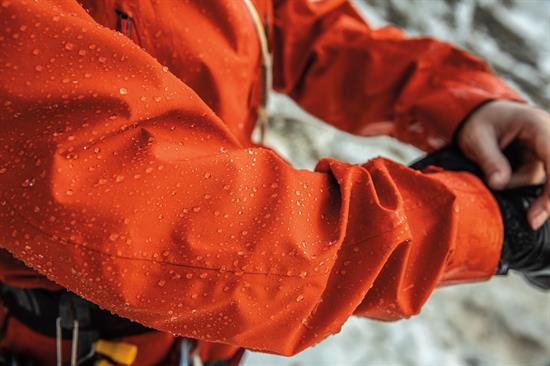Press Releases
Reps. Pingree, Moore Introduce Bipartisan Bill to Help Outdoor Retailers Phase Out Toxic Forever Chemicals
Washington,
February 4, 2025
U.S. Representatives Chellie Pingree (D-Maine) and Blake Moore (R-Utah) today introduced the bipartisan Protect Our Clothes from PFAS Act, which would make it easier for outdoor retailers to sell safer apparel that does not contain Per-and Polyfluoroalkyl Substances, or PFAS. The bill aims to eliminate a significant trade barrier that currently penalizes companies for choosing environmentally friendly alternatives to these harmful "forever chemicals" in water-resistant apparel. “Mainers have come to know how dangerous forever chemicals can be to our health and to the environment. I’m proud that Maine’s outdoor retailers are working to phase out PFAS despite the disparity in duty rates, but we want to level the playing field for companies who are moving towards safer alternatives,” said Pingree. “Our bipartisan Protect Our Clothes from PFAS Act will make it easier for retailers to choose safer alternatives that ensure their waterproof garments are not contributing to the contamination of our food and water, or the rise in cancer and other diseases linked to PFAS exposure. It's a commonsense solution that aligns our trade policy with public health—and incentivizes businesses to do the right thing.” “The outdoor recreation industry is critical to Utah’s economy, and waterproof apparel is essential to outdoor recreationalists and workers. It makes no sense to punish companies and their consumers with an outdated tariff code that keeps dangerous PFAS chemicals in our clothing,” said Moore. “By fixing a loophole in the Harmonized Tariff Schedule, this bill will help leverage U.S. trade policy for good and provide the necessary incentives for outdoor apparel companies to adopt healthier practices and safer value chains.” Currently, water-resistant clothing made with PFAS receives preferential tariff treatment with a 7% duty rate, while more sustainable alternatives face a 27% rate. The Protect Our Clothes from PFAS Act would encourage the transition to safer and more sustainable water-resistant garments, provided they meet standard performance requirements. The U.S. Harmonized Tariff Schedule Chapter 62 requires garments pass a water-resistance test and that the water-resistance must be the result of a rubber or plastics application to the garment’s outer shell, lining, or inner lining. This is commonly referred to as a durable water repellent finish (DWR), which often contain PFAS. The Protect Our Clothes from PFAS Act would remove the requirement that water-resistant garments must be the result of a rubber or plastics application to qualify for lower duty rates. This change would allow manufacturers to use innovative, PFAS-free waterproofing technologies while maintaining competitive pricing. PFAS—which have been linked to cancer, thyroid dysfunction, and other serious health issues—are nearly indestructible, and have been used in many household and consumer products, including water-resistant outdoor clothing, to repel grease, water, and stains.. The outdoor recreation industry has been working to eliminate these toxic substances from their products, but current tariff structures make this transition financially challenging. The legislation has gained strong support from the Outdoor Industry Association and L.L.Bean, a major employer in Maine's outdoor recreation economy and is a companion bill to legislation previously introduced by Maine U.S. Senators Susan Collins and Angus King. "Outdoor Industry Association (OIA) applauds the introduction of the bipartisan Protect Our Clothes from PFAS Act, which takes a meaningful step toward fostering safer practices and responsible production within the outdoor industry. By reducing the duty rate for water-resistant apparel made with PFAS-free alternatives, this bill incentivizes innovation and supports essential public health and environmental goals,” said Kent Ebersole, President of OIA. “With more than 90 industry-leading brands working through OIA programs to blaze the trail in the innovation and adoption of safer chemicals, this legislation is a critical step in ensuring outdoor enthusiasts have access to durable, high-quality gear while advancing sustainability. We sincerely thank Representative Pingree and Representative Moore for their leadership and commitment to advancing progress in the outdoor industry.” “The environmental and health concerns associated with PFAS exposure, both in Maine and elsewhere, prompted L.L.Bean to transition our products to PFAS-free alternatives. Unfortunately, current trade classification policy unintentionally penalizes companies who are doing the right thing by getting out of PFAS,” said Jason Sulham, Manager of Public Affairs at L.L.Bean. “The Protect our Clothes from PFAS Act removes that unintended consequence and aligns trade classification policy with sound environmental and health policy. Maine has been a leader in addressing the effects of PFAS and we are grateful to Rep. Pingree and the Maine delegation for addressing this barrier to progress.” “American Apparel & Footwear Association (AAFA) is grateful to Representative Pingree for introducing legislation to help ensure America's trade policy aligns with smart environmental and product safety goals and regulations,” said AAFA CEO Steve Lamar. “We are proud to support this measure so that innovative brands can invest in crafting safer products with lowered environmental impacts and not be penalized by paying higher prices because of those efforts. We urge Congress to take this up and pass it expeditiously. Pingree founded and launched the Congressional Slow Fashion Caucus in June 2024 to create climate-smart policies to curb the harmful effects of fast fashion and incentivize the apparel industry to promote reuse, repair, and recycling of textiles. She is also Ranking Member of the House Interior, Environment, and Related Agencies Appropriations Subcommittee, which oversees the Environmental Protection Agency, which is leading efforts to safeguard communities from PFAS contamination. ### |
Stay Connected
Enter your email address to get the latest updates


